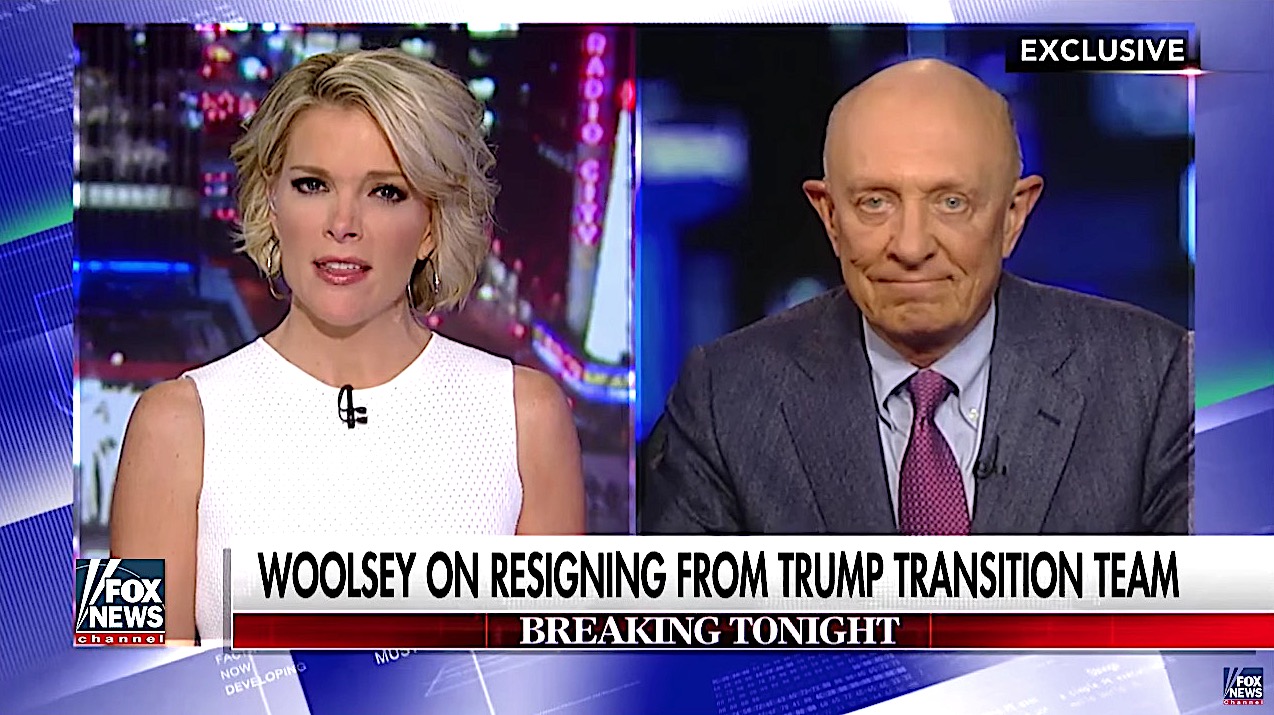Ex-CIA director James Woolsey doesn't quite tell Megyn Kelly, Erin Burnett why he quit the Trump team


A free daily email with the biggest news stories of the day – and the best features from TheWeek.com
You are now subscribed
Your newsletter sign-up was successful
On Thursday, former CIA Director James Woolsey announced through a spokesman that, "effectively immediately," he is "no longer a senior adviser to President-elect Trump." A "person close to Woolsey" tells The Washington Post's Philip Rucker that the veteran intelligence official had grown increasingly uncomfortable lending his name and imprimatur to the Trump team when he wasn't being included or consulted in intelligence discussions with Trump; that he was taken aback by Trump's reported plans to pare back the intelligence community; and that he bristled at Trump's use of Twitter. Woolsey is a "very principled" diplomat for whom "commas, periods, etc., all have special meaning," according to the Woolsey confidante.
Woolsely himself went on cable news Thursday night to explain why he was extracting himself from the Trump team. "I didn't want to fly under false colors," he told CNN's Erin Burnett, who pointed out that Woolsey has contradicted Trump several times recently, espcially regarding Trump's frequent suggestions that Russia was not behind the election hacking of Democrats. "Is part of why you're leaving that you're frustrated with him?" she asked. He said no, then explained that with the new "extremely important" disclosures about the Russia-WikiLeaks go-betweens, he's now persuaded that the Russian interference was "more or less centrally orchestrated." Woolsey became discreet when Burnett asked if he thinks Trump should now admit it was the Kremlin, too.
Woolsey tried to be equally diplomatic on Thursday night's Kelly File. "I didn't actually resign," he told Megyn Kelly. "What I said is that I wanted it known I was not working on the transition." "But why was that important to you, to make that distinction?" she asked. People kept calling him a senior adviser on the transition, and "I didn't think it was right to claim something that was not the case," he said. Kelly brought up the Washington Post report, and Woolsey confirmed that he "was not really called upon go to meetings or participate in work on the transition," other than briefing reporters. But he didn't bite when she asked about the Twitter abuse, and said he could support the right reform of the intelligence agencies.
The Week
Escape your echo chamber. Get the facts behind the news, plus analysis from multiple perspectives.

Sign up for The Week's Free Newsletters
From our morning news briefing to a weekly Good News Newsletter, get the best of The Week delivered directly to your inbox.
From our morning news briefing to a weekly Good News Newsletter, get the best of The Week delivered directly to your inbox.
"I just need to press you, Jim, I apologize — you're a gentleman for coming on — but I do want to give you a chance," Kelly said. "Are you challenging the reporting by The Washington Post tonight?" "Well, no," he said. "I think they were focused on an important issue, which is what type of change is going to be proposed in the intelligence community's organization, especially, by the Trump administration in two weeks, and I can't tell." Peter Weber

A free daily email with the biggest news stories of the day – and the best features from TheWeek.com
Peter has worked as a news and culture writer and editor at The Week since the site's launch in 2008. He covers politics, world affairs, religion and cultural currents. His journalism career began as a copy editor at a financial newswire and has included editorial positions at The New York Times Magazine, Facts on File, and Oregon State University.
